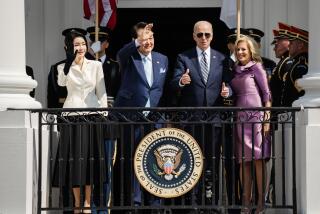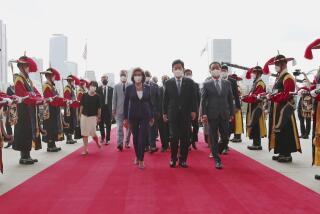Rice Visits Asia With Eye on North Korea
- Share via
ANCHORAGE — Secretary of State Condoleezza Rice arrives in Beijing today on a six-day swing through Asia aimed at luring North Korea back to nuclear disarmament talks after more than a year.
However, Rice said the U.S. was not discussing sweetening the offer it made to Pyongyang a year ago, when it promised security assurances and the possibility of better economic and political ties if it agreed to verifiable dismantlement of its nuclear programs.
North Korea has since declared that it has nuclear weapons and is manufacturing more to defend against what it terms a “hostile” United States.
U.S. allies in the six-party talks, including China and South Korea, have urged Washington to make a more attractive offer. But Rice told reporters aboard her airplane, “We have not been talking about enhancement of the current proposal.” She ruled out providing the civilian nuclear power reactors that North Korea has reportedly insisted on as part of any disarmament deal.
“There are attendant proliferation risks with nuclear power that are hard to minimize given the history with North Korea,” Rice said. She was referring to U.S. allegations that the country had been enriching uranium despite a now-defunct deal with the Clinton administration to freeze its nuclear programs in exchange for free U.S. oil shipments and the construction of two light-water nuclear reactors by an international consortium.
Rice did not rule out a South Korean initiative to offer energy assistance to the North as part of a comprehensive deal. She said that during a visit to Seoul, she planned to explore South Korean diplomats’ “very useful” ideas for meeting energy-starved North Korea’s needs.
Rice is also expected to visit Japan and tour U.S.-funded tsunami relief efforts in Thailand.
Rice said that in Beijing, she would discuss the U.S. desire for China to revalue its currency, as well as human rights and religious freedom. U.S.-China relations have been strained by recent developments, including tensions over textile imports, China’s trade surplus, its increase in military spending and the recent bid by a Chinese state-controlled oil company to take over Unocal Corp.
Rice said she would not be discussing the Unocal offer, because she had served on the board of parent company Chevron and has recused herself from policy talks on the subject.
Congress recently passed a nonbinding resolution opposing CNOOC Ltd.’s takeover bid on national security grounds, a move that brought a sharp rebuke from Beijing. Chinese analysts said they did not expect Beijing to make an issue of the Unocal bid in the talks with Rice, other than perhaps to reiterate its view that the matter should be handled as a business deal, not a political issue.
Nevertheless, Wang Yong, assistant professor of political economy at Peking University, said the Unocal issue came at a bad time given other U.S.-China sensitivities. “It’s very unfortunate,” he said.
Top on Beijing’s agenda, as usual, will be Taiwan. China will look for assurances that Washington has not changed its view on cross-strait relations, analysts said. And it may voice concern that Japan appears to be cozying up to Taiwan, possibly with U.S. encouragement.
So far, U.S.-China tensions have not affected negotiations on North Korea, both sides said.
Rice said the trip, which was called on short notice, was a time to “take stock” after a flurry of diplomacy and to learn how her Asian counterparts viewed the status of the stalled nuclear talks, which include North Korea, South Korea, the U.S., China, Russia and Japan.
U.S. allies have voiced concern that Washington hasn’t done enough to show it isn’t so hostile to the North as to make diplomacy meaningless. In response, U.S. officials have repeatedly said Washington respects the communist state’s sovereignty and has no intention of attacking or invading it.
When Pyongyang said it wanted to hear the message face to face, U.S. diplomats met twice in recent months with North Korean diplomats in New York.
Many U.S. hard-liners, including some administration officials, are skeptical that North Korea intends to bargain away its nuclear arsenal. But Chinese analysts note that North Korea’s economy has continued to worsen, increasing the pressure on leader Kim Jong Il to strike a deal.
*
Efron reported from Rice’s plane and Magnier from Beijing.
More to Read
Sign up for Essential California
The most important California stories and recommendations in your inbox every morning.
You may occasionally receive promotional content from the Los Angeles Times.













